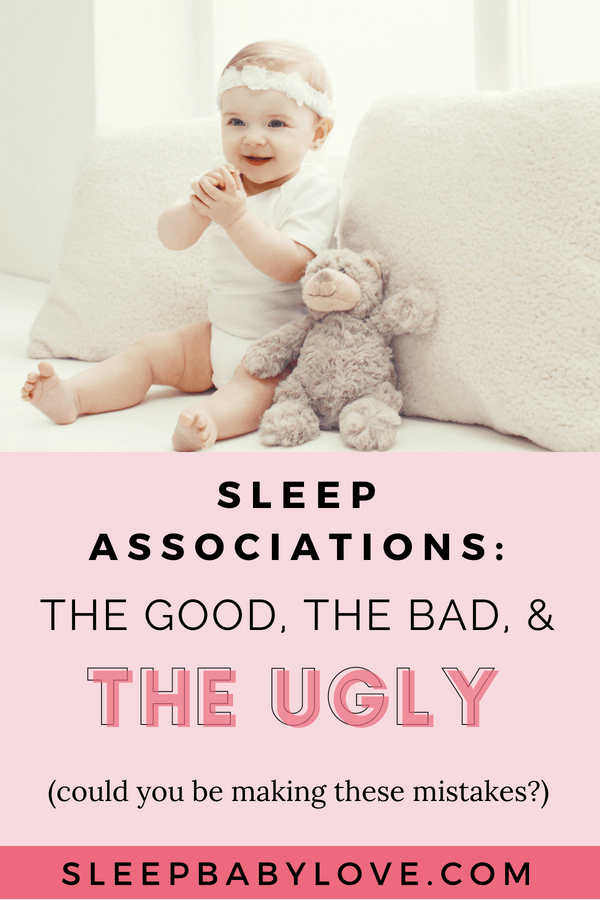Baby Sleep Associations: The Good, The Bad, and The Ugly
Your baby is now four months old, and you start to notice a disturbing trend in their sleep habits. In previous months you had a method that worked but now? Not so much.
You’re plagued with short naps, and nighttime is interrupted by frequent wake-ups. What gives???
It’s time to look at your baby sleep associations and see if that is helping or harming their overall sleep pattern.
WHAT IS A SLEEP ASSOCIATION?
According to MyBabySleepGuide.com, a sleep association is something that a child associates with falling asleep. I would take that definition a step further and say that a sleep association is anything that your baby can’t fall asleep without.
Anything can be a sleep association if your baby needs it to fall asleep, such as:
Types of Baby Sleep Associations
- Rocking/Swaying
- Swaddle
- Bed-Sharing (being in your presence)
- Holding
- Nursing
- Bottle Feeding
- Bouncing
- Driving-Motion
- Swing
- Rock-N-Play
- Attachment Object (Blanket/Lovie)
- Pacifier
- Baby Wearing
In a parent’s desperate attempt to help their baby get a minute more of sleep, many will do ANYTHING it takes to get that last minute of shut-eye and try any product on the market.
The Difference Between a Good and Bad Baby Sleep Association
Sleep associations only become “bad” when they get in the way of great sleep. A more natural way to know if a sleep association exists is if your baby can’t “stay” asleep after going to sleep in a certain way.
For example: If your baby is nursed to sleep and wakes up 20 minutes later, needing you to nurse them back to sleep – nursing is a sleep association.
Let’s try another one – If your baby is dependent on a pacifier and wakes up every 2 hours needing that pacifier to be replaced by you every time – my friends, that’s a negative sleep association.
On the other hand, if your baby uses a pacifier to fall asleep but can sleep through the night, you’re golden. The pacifier in this example is a positive sleep association. Yes, something is used, but it’s not getting in the way.
Get it?
YOU CAN’T SPOIL A BABY AND CREATE BAD HABITS AS A NEWBORN
Don’t worry about creating habits within the first two months of your baby’s life. Your baby is just a newborn and can be expected to act like one with fragmented nights and multiple feedings throughout the day.
During this time, pretty much all the sleep associations may be used, and it doesn’t mean that you are going to nurse your 4-year-old to sleep.
Babywearing is one way that parents found the comfort of toting their newborn while getting things done around the house or tending to other children. Medical professionals suggest that infants thrive through touch, so wearing your baby is another way to meet that need.
SLEEP ISSUES MAY REAR THEIR UGLY HEAD
Around the 4-month mark, when sleep consolidates and becomes more aware, you may find that the sleep associations that worked beautifully to get them to fall asleep may not help your baby “stay asleep.” Short naps and frequent night wakings can become quite a headache.
A problem isn’t a problem until it becomes a problem.
You never need to fix a problem until it’s a problem.
But when you are desperate for long naps and longer stretches of sleep, you have to take a look at your baby’s sleep associations to see what can be reduced or minimized to lessen your baby’s association with you (or anything that is helping or hurting sleep).
EARLY SLEEP PROBLEMS CAN BE LATER SLEEP PROBLEMS
There are several long-range studies regarding childhood sleep habits and the effects of adolescence and adulthood. For example, one study in Montreal among 987 parents demonstrated that early sleep problems in 5 – 17 months continued for older children between 29-40 months. This study showed that certain habits such as mother present at sleep onset or giving food/drink after child awakens due to sleep difficulties led to disturbed sleep such as bad dreams, taking longer to fall asleep, and disrupted sleep.
SLEEP AFFECTS FUTURE OBESITY
Other studies demonstrate the effect of sleep as it relates to obesity rates. A British study showed that those who have less than 10.5 hours of sleep at age 3 have more than a 45% chance of becoming obese by age 7. Another survey from Elsie M. Taveras, examined sleep duration starting at six months. Elise found that sleeping less than 12 hours per day was linked to future obesity rates.
PREVENT BAD HABITS TO PREVENT FUTURE PROBLEMS
In case you haven’t learned my story – I am a mom of two girls, and I’ve had to fix many baby, and toddler sleep challenges personally. My second daughter is the reason that I am a sleep consultant. This allows me to confidently say that I’ve been in your shoes, and you will get through this!
The best way that I can describe the way I parent is that I always try to prevent bad habits from forming in the first place.
I like to think of my children’s sleep like a big boat barreling into the sea. Sure, we hit some rocky waves and go through periods where I’m getting knocked around a bit. But, I will NEVER allow my child’s sleep boat to tip over because it’s way too hard to recover when you’re in a flipped boat in the middle of the sea.
Yes, that means that I don’t allow my kids to come into my bed, and I don’t stay with them to fall asleep. But that doesn’t mean that I love them any less.
I know I’m not alone in my discipline to prevent future issues from happening.
Dr. Elsie Taveras of Harvard Medical School was quoted in a Time Interview-“…if you approach [sleep] differently — ‘I am not even going to start my child making these sleep associations’ — it’s much easier to prevent [future problems].”
If you’re reading this and have yet to have the issues start in the first place, go ahead and feel free to know that you’re doing a great job and to keep doing what you’re doing!
If you are starting to encounter issues, my caution is this: Be very deliberate in how you create sleep patterns for your baby, NOW! It will ultimately save you hours of sleep.
Conclusion:
Figuring out if you have a positive sleep association is the best first step you can make with your baby’s sleep. Once you know if the association is negative – then you can change. Don’t think you have to go it alone – my ultimate sleep training article or working with me directly is the next best step.
Do you use any sleep associations? Are they working for you or do you have to get rid of them soon? Comment below – I would love to know!



